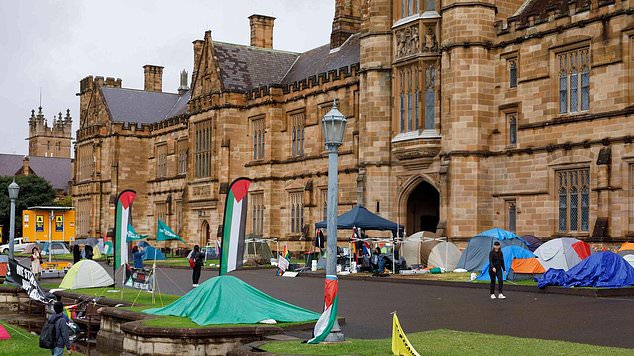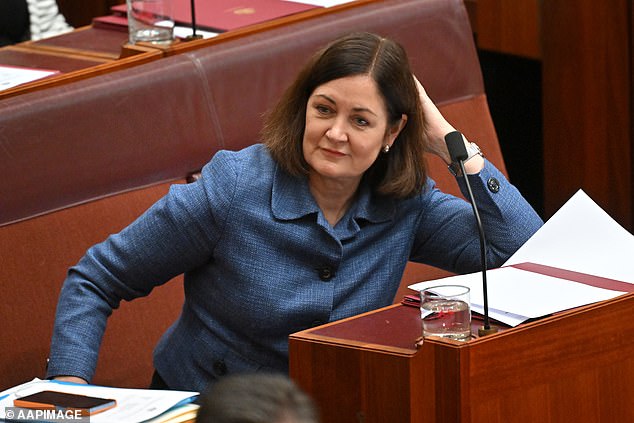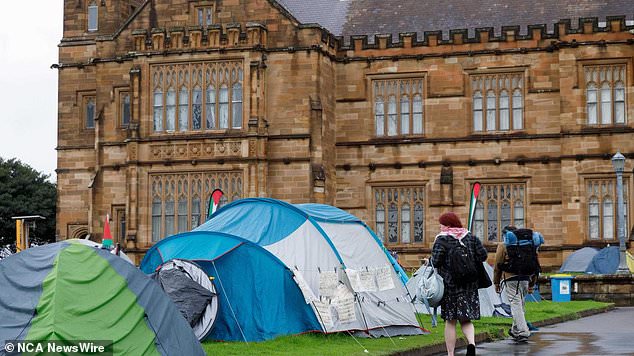‘We failed you’: University boss offers humbling apology as he reveals fears of violent on-campus outbreak
University of Sydney Vice-Chancellor Mark Scott has apologised for the “unacceptable” antisemitism experienced by Jewish staff, students and alumni during an eight-week pro-Palestinian protest camp.
Speaking to the Senate Committee on Anti-Semitism on Campus, Prof. Scott said it was unacceptable for Jewish students and staff to feel “unsafe” during this time and that both he and the university had “failed” them.
“I have read the complaints that have been made to the university and to all those involved in the submissions to this investigation and to the special envoy, and the testimonies are heartbreaking and unacceptable,” he said.
“For that, I apologize. No one should feel endangered, unsafe, or unwelcome in a place of learning, and no one should feel the need to hide their identity or stay away from classrooms or campuses.”
In April, pro-Palestinian camps flooded the university square, where they remained for about eight weeks before being ordered to evacuate.
Prof Scott said it had been a ‘difficult time for the university’ and admitted the university’s response had not met community expectations.
“First of all, I regret that we did not communicate the agreement to end the camp to the Jewish community before it was announced,” he said
“I recognize that there is still much work to be done to regain the trust of the university’s Jewish community, and I am committed to doing so.”
Mark Scott, vice-chancellor of the University of Sydney and former ABC chief executive, has apologised to students for not acting sooner

The University of Sydney feared a violent outbreak if the protest was forcibly dispersed
When asked why the university had not intervened earlier, Professor Scott said he had looked at international comparisons of campuses in the US and believed that acting earlier would only have made the situation worse.
He said there were fears that tensions would “escalate dramatically” and there was a risk of violence if the university called in riot police to disperse the protesters.
Following the protest, Prof Scott said the university had banned camps and launched an independent investigation into relevant policies and processes.
“This was a complex, rapidly changing environment where we met daily and made numerous decisions based on the best information available to us at the time, as well as taking advice from experts, particularly the police and security services,” he said.
‘Did we make all the right decisions during that time? There are clearly different opinions about that and I recognize that we did not always meet the expectations of the Jewish community.’
However, opposition education spokesperson Sarah Henderson said Professor Scott had failed in his leadership and questioned why he had not banned camping on campuses and removed the encampments earlier.
Although she did not call for Professor Scott’s resignation, she later told reporters the university’s investigation was “too little, too late”.
“Whether he continues to fulfill his role is his own business, but I believe he has fundamentally failed not only Jewish students and staff at the university, but all students,” she said.

Senator Sarah Henderson has accused the University of Sydney of doing ‘too little, too late’ to protect Jewish students and staff at one of the country’s largest campuses
Earlier on Friday, Zachary Morris, vice-president of the Australasian Union of Jewish Students, called the university “probably one of the worst places to study as a Jewish student”, saying the campus “has been problematic for a long time”.
Senator Henderson, who introduced the Coalition bill to establish a judicial inquiry into antisemitism in universities, criticised Education Minister Jason Clare and the government for “not doing enough”.
“They have not shown the moral courage to say to the vice-chancellors of the universities: this is not good enough,” she said.
Alon Cassuto, chief executive of the Zionist Federation of Australia, said a national model and university ombudsman were needed to monitor complaints of discrimination in universities.

The pro-Palestinian camps lasted about eight weeks before being closed
“Anti-Semitism is not even one of the options you can tick when you file a complaint against discrimination,” he said.
He added that he did not believe university administrators were enforcing the rules, even though there was a policy.
“I think that the university administration has the ability to take action, but they just don’t do it. So we need to investigate why that is,” he said.
Matthew Brown, deputy chief executive of the Group of Eight, defended the universities, saying the group, which represents Australia’s top eight universities, believes universities should uphold freedom of expression.
Dr Brown also said he believed social cohesion was ‘under threat’.
“Young people are radicalized long before they get to university. We need to deal with that at a societal level,” he said.
